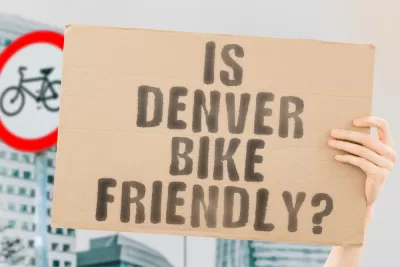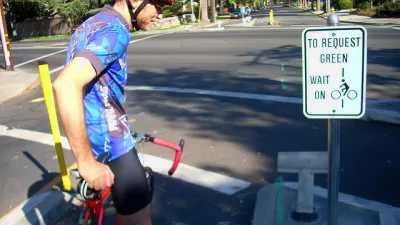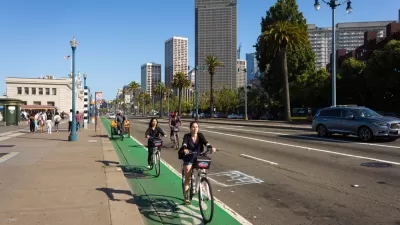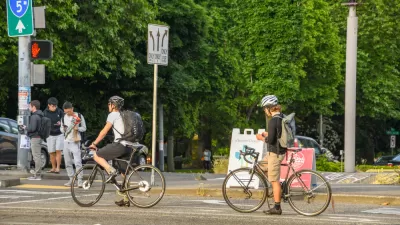Pending Gov. Polis's signature on a bill approved recently by the Colorado State Legislature, Colorado will become the latest state to allow people on bikes to yield at stop signs.

Another state is inching closer to allowing people on bikes to roll through stop signs and treat stop lights as stop signs: Colorado. The maneuver is known as the Idaho Stop, and it seems to gain more political and legal traction with every passing year.
"If enacted, House Bill 1028 would permit bicycles, e-scooters and other non-motorized vehicles to treat stop signs as yield signs and to treat red lights as stop signs when motorized vehicles are not around. This practice — colloquially called Idaho stops or rolling stops — lets bicyclists avoid making unnecessary stops if cars aren’t there," reports Hannah Metzger for Colorado Politics. Bill sponsor Sen. Faith Winter, D-Westminster, is quoted in the article touting the safety benefits of the Idaho Stop.
“It’s safer for bicyclists, it’s safer for drivers [….] Bikes are more able to stay within the flow of traffic, they’re more visible and it increases safety.” -Colorado Sen. Faith Winter, D-Westminster.
The Colorado Legislature approved HB 1028 on March 23—the bill still awaits final changes in the state's House of Representatives and the signature of Governor Jared Polis. We won't assume it's a done deal, however. The last state to approve an Idaho Stop bill, California, saw the bill die by governor's veto in October 2021.
A separate article by Nathaniel Minor, published by CPR News, discusses the racial equity benefits of legalizing the Idaho Stop. Bike advocates in the state say the new law will keep riders of color safer from cars and the police.
FULL STORY: Colorado legislature OKs ‘Idaho stops’ for bicyclists statewide

Alabama: Trump Terminates Settlements for Black Communities Harmed By Raw Sewage
Trump deemed the landmark civil rights agreement “illegal DEI and environmental justice policy.”

Planetizen Federal Action Tracker
A weekly monitor of how Trump’s orders and actions are impacting planners and planning in America.

How Atlanta Built 7,000 Housing Units in 3 Years
The city’s comprehensive, neighborhood-focused housing strategy focuses on identifying properties and land that can be repurposed for housing and encouraging development in underserved neighborhoods.

In Both Crashes and Crime, Public Transportation is Far Safer than Driving
Contrary to popular assumptions, public transportation has far lower crash and crime rates than automobile travel. For safer communities, improve and encourage transit travel.

Report: Zoning Reforms Should Complement Nashville’s Ambitious Transit Plan
Without reform, restrictive zoning codes will limit the impact of the city’s planned transit expansion and could exclude some of the residents who depend on transit the most.

Judge Orders Release of Frozen IRA, IIJA Funding
The decision is a victory for environmental groups who charged that freezing funds for critical infrastructure and disaster response programs caused “real and irreparable harm” to communities.
Urban Design for Planners 1: Software Tools
This six-course series explores essential urban design concepts using open source software and equips planners with the tools they need to participate fully in the urban design process.
Planning for Universal Design
Learn the tools for implementing Universal Design in planning regulations.
Jessamine County Fiscal Court
Caltrans
Institute for Housing and Urban Development Studies (IHS)
City of Grandview
Harvard GSD Executive Education
Toledo-Lucas County Plan Commissions
Salt Lake City
NYU Wagner Graduate School of Public Service





























